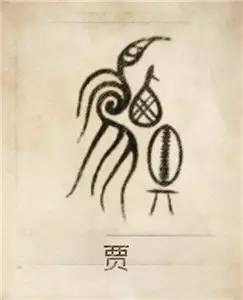The Jia (jiǎ) surname is one of the oldest and most culturally significant surnames in China. With a history spanning thousands of years, the Jia surname has played a pivotal role in shaping Chinese politics, literature, science, and agriculture. For friends readers interested in Chinese heritage, the story of the Jia surname offers attractive window into the evolution of Chinese society and its enduring cultural legacy.

Ⅰ、Origins of the Jia Surname
1. Take the country as the surname
During the early Western Zhou Dynasty (1046–771 BCE), King Kang of Zhou granted the territory of Jia (in present-day Xiangfen, Shanxi Province) to Gongming, the youngest son of Tang Shuyu (a son of King Wu of Zhou). The Jia State existed for 342 years until it was conquered by Duke Wu of Jin in 678 BCE. The descendants of the Jia State adopted "Jia" as their surname, forming the earliest branch of the Jia family.
2. Named After a Fiefdom
During the Spring and Autumn Period (770–476 BCE), Hu Shegu, the son of the influential statesman Hu Yan, was granted the fiefdom of Jia (the former territory of the Jia State) for his contributions to the Jin State. Known historically as Jia Ji, his descendants adopted "Jia" as their surname after he was exiled during a political struggle.
3. Other Origins
The Jia surname also has roots in the ancient Shang Dynasty, where it was associated with the Zi clan. Additionally, descendants of officials who managed trade during the Zhou Dynasty, as well as members of Mongol and Manchu ethnic groups who adopted the surname during the Northern Wei to Qing Dynasties, further enriched the Jia family's diverse heritage.
Ⅱ、Historical Figures
1. Political Strategists
Jia Yi (200–168 BCE): A renowned political theorist of the Western Han Dynasty, Jia Yi is best known for his essays "On the Faults of Qin" and "On the Accumulation of Wealth." His ideas on centralization of power were highly influential and earned him praise from modern literary giant Lu Xun.
Jia Xu (147–223 CE): A master strategist during the Three Kingdoms period, Jia Xu was instrumental in helping Cao Pi ascend to the throne of the Cao Wei Kingdom. He is often regarded as one of the "Eight Gentlemen of the Wei and Jin Dynasties."
2. Scientific and Agricultural Pioneers
Jia Sixie (Northern Wei Dynasty): The author of Qi Min Yao Shu (Essential Techniques for the Welfare of the People), Jia Sixie's work is considered the earliest and most comprehensive agricultural text in Chinese history, predating similar European works by a millennium.
Jia Xian (Northern Song Dynasty): A mathematician who pioneered the "Jia Xian Triangle" (a precursor to Pascal's Triangle), laying the foundation for solving higher-order equations.
3. Literary and Artistic Figures
Jia Dao (779–843 CE): A Tang Dynasty poet known for his meticulous craftsmanship, Jia Dao is famous for the story of "pushing and knocking" (to deliberate over word choice). His works, such as The Collection of the Yangtze River, are celebrated for their depth and precision.
The Jia Family in Dream of the Red Chamber: Although fictional, the Jia family in Cao Xueqin's masterpiece Dream of the Red Chamber serves as a symbolic representation of the aristocratic culture of the Ming and Qing Dynasties.
Ⅲ、Cultural Significance:
1.Ancestral Halls and Clan Names
The Jia family is associated with prominent regional origins, such as Wuwei (Gansu Province) and Luoyang (Henan Province). Their ancestral halls often bear names like "Zhiyan Hall" , inspired by Jia Shan's Zhiyan, or "Wuwei Hall" , highlighting their military achievements.
2.Family Values and Teachings
The Jia family emphasizes virtues such as wisdom, diligence, and integrity. For example, the Jia family motto from the Qing Dynasty underscores the importance of "virtue, wisdom, loyalty, and sincerity."
Ⅳ、Social Impact:
1.Population Distribution and Migration
Today, there are approximately 3.7 million people with the Jia surname. They are primarily concentrated in Hebei, Henan, and Shanxi provinces, with smaller communities in Sichuan and other regions.
Over the centuries, the Jia family has migrated southward, reaching as far as Taiwan and Southeast Asia during the Ming and Qing Dynasties.
2.Modern Contributions
The Jia family continues to make significant contributions in fields such as agriculture, literature, and science. For instance, Jia Sixie's agricultural techniques remain relevant in modern farming practices.
The fictional Jia family in Dream of the Red Chamber has become a cultural icon, inspiring countless adaptations in film, television, and academic research.
Conclusion
The history of the Jia family is a testament to the resilience and adaptability of Chinese culture. From ancient states to modern achievements, the Jia surname embodies the rich tapestry of Chinese history. For those interested in exploring the roots of Chinese civilization, the story of the Jia family offers a compelling narrative of heritage, values, and enduring legacy.